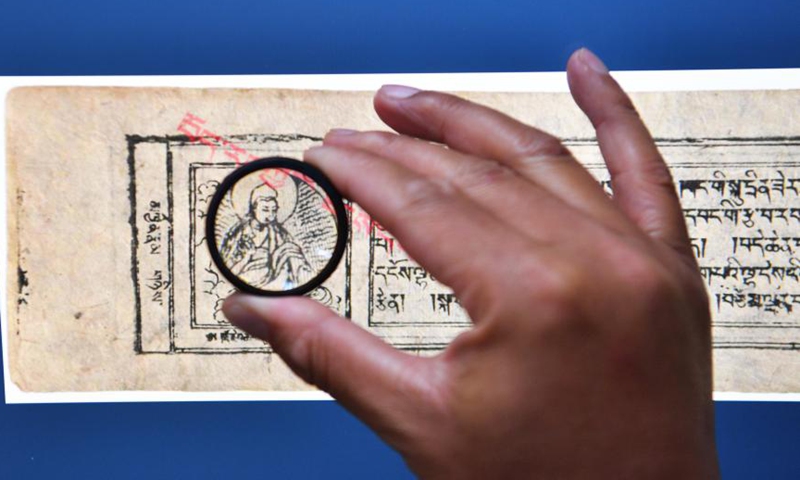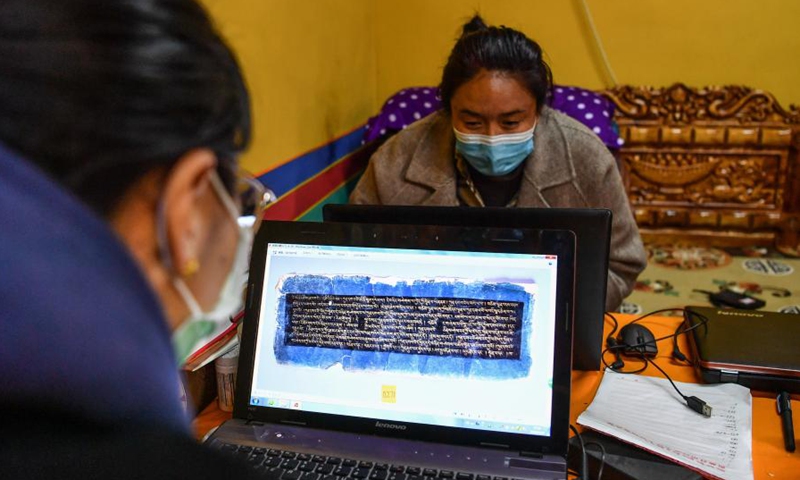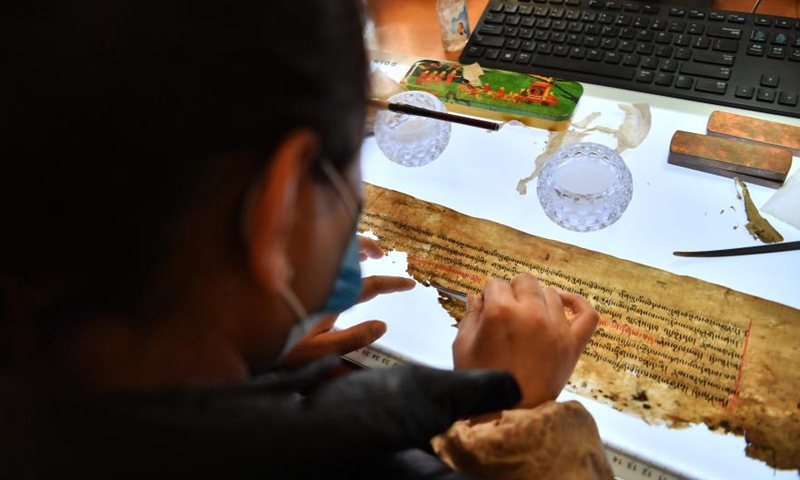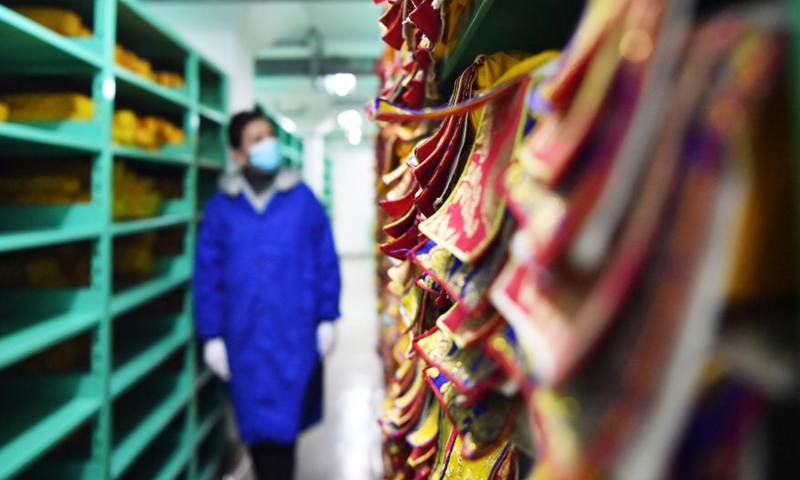
A researcher reads historical files about Tibetan culture on an online platform under the official website of the Tibet Library in Lhasa, southwest China's Tibet Autonomous Region, April 20, 2021.Photo:Xinhua
Southwest China's Tibet Autonomous Region has filled an online "treasure house" with priceless ancient books for lovers of Tibetan culture worldwide.
As part of efforts to protect the ancient culture, the regional ancient book protection center announced it had uploaded rare ancient books with over 20,000 folios to an online platform under the official website of the Tibet Library.
Users can search, copy and download the valuable books for free on the platform, which covers biographies of Tibetan scholars and the history of Tibet and Buddhism that span from the 12th to the 20th century.

Staff members with the regional ancient book protection center upload digital scans of rare ancient books to an online platform under the official website of the Tibet Library in Lhasa, southwest China's Tibet Autonomous Region, April 20, 2021.Photo:Xinhua
ANCIENT CULTURE AT FINGERTIPS
A lover of ancient books, Qungda, a senior citizen in the regional capital Lhasa, marvels at the convenience of the platform. After reading several articles via a mobile phone with the help of his son, he said the platform not only makes it convenient for readers but represents an innovative way of protecting and utilizing ancient books.
"It clearly manifests the country's protection of traditional Tibetan culture," he added.
"The precious books uploaded this year, mainly biographies, cover the knowledge of the ancient Tibetan society, economy and folk customs, which provide valuable materials for the study of Tibetan culture and history from multiple perspectives and disciplines," said Penpa Tsering, deputy director of the center.
"Previously only a few scholars read the books due to the complex application procedure and other steps," he added. "Now they are available for global readers and can better serve society."
Considering the precious ancient books as a fragile cultural resource, the center has adopted a slew of advanced techniques such as non-contact high-definition scanning to prevent any damage to the books.
"The scanning was supervised throughout the whole process, so as to avoid any damage," said Tselo, a staff member of the center.
Meanwhile, experts have adopted special techniques to process the original pictures of the books with the purpose of preventing piracy and other improper use.
"The platform will play a leading role in the country's digital online sharing of ancient Tibetan books. I believe there will be more similar platforms in the future as a solid foundation for the preservation and inheritance of traditional Chinese cultural classics," said Penpa Tsering.
Since its trial operation on April 25, 2020, the platform has received nearly 100,000 visits, setting a record high for the library's website.

A staff member with the regional ancient book protection center restores a rare ancient book in Lhasa, southwest China's Tibet Autonomous Region, April 21, 2021.Photo:Xinhua
ARDUOUS EFFORTS BEHIND THE ACHIEVEMENT
In 2009, Tibet launched its largest ever survey of ancient books. Over the past decade, the surveyors have traveled to every corner of the region that covers more than 1.2 million square km, with the goal of preserving every last ancient book.
"It's hard to describe my excitement when I find rare books and learn unknown history from them in the survey work," said Nyishar, head of the ancient classics department of the center.
As part of the survey work, a book discovered by Nyishar proved the history of Tibetan engraving printing stretches back at least a century earlier than previous research had indicated.
The workers have also discovered and rescued a large number of precious ancient books with great literary, cultural and artistic values. Some of the books were once believed to be lost.

A staff member with the regional ancient book protection center checks rare ancient books in Lhasa, southwest China's Tibet Autonomous Region, April 21, 2021.Photo:Xinhua
"After more than 10 years' efforts, we have made great progress in the survey work, but there is still a long way to go," said Penpa Tsering.
He added the center expects to receive suggestions and feedback from experts, scholars and users at home and abroad to help tackle the problems the team is facing such as the digital identification of the books.
"Tibet is sharing these precious ancient books with the world, which not only reflects the cultural confidence of China, but provides huge convenience for the researchers of Tibetan studies," said Yeshe Zangpo, an official with the regional government.
"We hope to let more valuable ancient books come alive and better serve the society and all mankind," he added.

A staff member with the regional ancient book protection center arranges rare ancient books in Lhasa, southwest China's Tibet Autonomous Region, April 21, 2021.Photo:Xinhua
